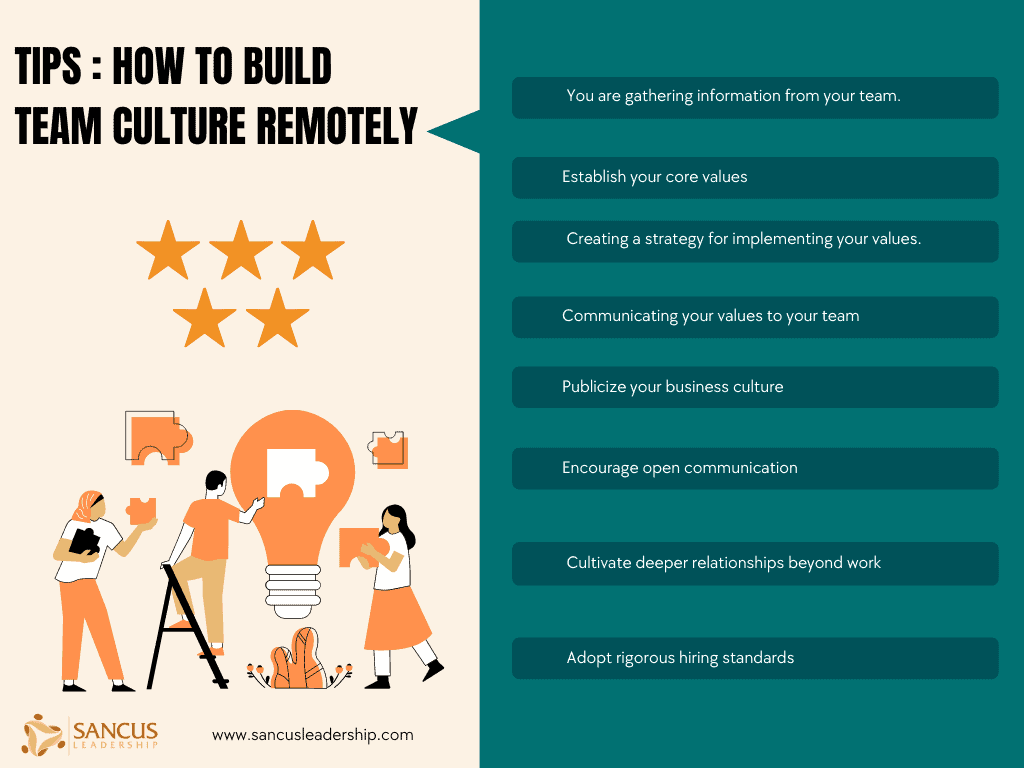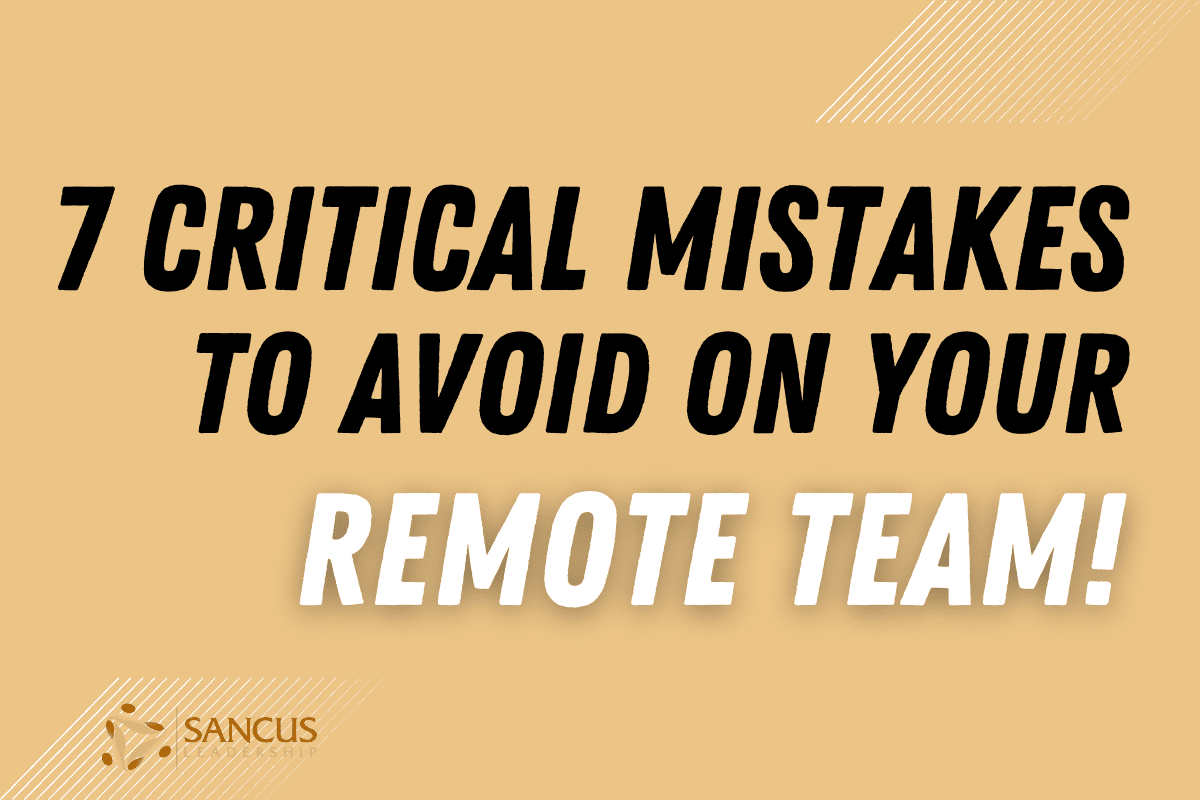Building a healthy business culture for a remote team does not happen organically as in a physical location. As the leader, you must work harder to ensure your team buys into the company’s core values and remain connected through shared goals. While doing this, there are some mistakes you should watch out for.
One mistake to avoid when building culture on your remote team is overlooking communication needs. The lack of physical proximity necessitates regular check-ups to get updates on your team’s progress. This reduces the chances of deviating from the company’s main goals and core values.
You’re in the right place if you are eager to build a healthy culture on your remote team. This article covers seven mistakes to avoid while building a business culture remotely. It also includes some tips on building team culture remotely and maintaining it when transitioning to remote work.
1. Failing To Communicate Work Culture to Your Team

Every business has a culture that can be defined or undefined. Companies with defined cultures have shared attitudes, values, beliefs, and assumptions. Conversely, those with undefined cultures tend to have everyone on the team act as they wish, resulting in a lack of coordination.
Work culture usually begins from the top. When working in an office, it’s easy for a team to follow a leader’s example and form a culture. However, in a remote setting, the lack of physical contact denies your team a chance to learn from you.
If you communicate your values to your team verbally or in writing form and how you expect them to behave, you’ll have a functional work culture. You should never assume your team knows how you expect them to conduct themselves.
If you communicate your values to your team verbally or in writing form and how you expect them to behave, you’ll have a functional work culture.
2. Lack of Effective Leadership

Teams are always a reflection of their leaders, so if a business fails to meet its remote culture goals, the inefficiency most likely comes from the leadership. Leading a remote team is different from leading a physical team.
We as leaders must take extreme ownership if we are to be successful!
If a remote leader fails to leverage technology to keep their team organized and aligned in the same direction, they’ll encounter challenges along the way.
Before anyone assumes a remote leadership role, they should undergo training to equip themselves with the technological, interpersonal, and communication skills to bridge distance limitations.
A successful remote leader should enhance teamwork and push the team towards the same goal.
A successful remote leader should enhance teamwork and push the team towards the same goal.
3. Not Establishing Effective Communication Means

Efficient communication is the backbone of every successful (remote) organization. It enhances cohesion and collaboration by ensuring the team receives timely updates and the leaders get feedback when needed.
In an office setting, communication is easier. You can get hold of your team whenever you want and use nonverbal cues to build trust and give your message the weight it deserves.
On the other hand, working with a remote team requires you to rely on digital technology for all your communications. Although most remote leaders have the right communication tools, they lack the knack for how and when to use them to ensure efficiency.
…most remote leaders have the right communication tools, they lack the knack for how and when to use them to ensure efficiency.
Not knowing how to use communication tools effectively leaves the team without clarity of their responsibilities, the project’s progress, and the timelines they’re supposed to observe. As a result, misunderstandings and conflicts arise, making it difficult to work as a team.
To lead a successful team, you should have structured communication. Your team should know your company’s communication channels, which should go beyond written communication, including video teleconferencing channels such as Zoom. Also, have a schedule of meetings where you’ll give updates on the way forward.
4. Failing To Equip Your Team With the Right Tools

A study by ConnectSolution shows that 77% of remote workers are more productive at home than in an office, with 30% taking less time to complete tasks. These statistics can be promising when building a remote team.
A study by ConnectSolution shows that 77% of remote workers are more productive at home than in an office, with 30% taking less time to complete tasks.
However, you can only realize such success if your team has the right tools to work from home. Most remote organizations shift the responsibility of gathering remote working tools such as laptops and ergonomic seats to the team, which can be overwhelming and lead to:
- Lack of collaboration. Without the right working tools, it’ll be impossible for the team to meet deadlines. Some members may be ahead and others behind, making it challenging to work and progress as a team.
- Inability to attract and retain talent. Your team may find it frustrating and unsatisfying to work for you because they cannot meet the desired results. Changing your team from time to time makes it hard to cultivate a thriving culture.
- Reduced productivity. Lacking the right tools causes your team to spend more time completing a task, which can result in burnout, decreased morale, and low work quality.
5. Recruiting Mismatch Candidates

Remote work is not suitable for everyone. When hiring a remote worker, you should look for more than talent. The candidate’s temperament, skills, and work ethic should perfectly match what you have specified in the job description.
The mistakes that most remote leaders make when hiring are failing to discuss the company’s culture during the hiring process and undermining the candidate’s personality and traits. What happens is you bring on board a team that’s unmotivated and unable to work independently.
The mistakes that most remote leaders make when hiring are failing to discuss the company’s culture during the hiring process and undermining the candidate’s personality and traits.
Before signing a contract, all recruits should know your remote working culture, what you believe in, your goals, and what you expect of them. Their signature on the work contract should serve as consent that they agree to abide by the company’s values.
6. Lack of Team Engagement

When working in an office, workers have the privilege of staying engaged with one another in a formal and nonformal way. An employee can stop by another team member’s cubicle to ask for opinions about their upcoming project. Or go out for coffee and have an informal conversation about work.
Such engagements foster connections and deep relationships, which promote teamwork and cohesion. It gives everyone a sense of belonging for being part of the company’s mission.
In contrast, there are no face-to-face interactions in a remote setting, making your team prone to disengagement and boredom. The result is decreased productivity and a lack of motivation to take up more work.
Managing a remote team requires planning for strategies to bring your team together, which could include the following:
- Having regular meetings with the team and individual members.
- Creating communication channels like Google Hangout to allow team members to interact casually as they work.
- Having fun activities such as playing games virtually and encouraging everyone to participate.
7. Lack of Defined Goals and Responsibilities

Leaders mostly assign different roles and projects to remote workers. This constant shift to unrelated roles from time to time leads to a lack of clarity on team members’ responsibilities. It also causes the team to lose focus on the main goal.
The lack of defined responsibilities and goals leads to confusion and decreased productivity because team members don’t know what’s expected of them. Also, it becomes challenging to hold anyone accountable.
Every team member should know their roles and predetermined timelines in advance. They should also know how their roles relate to those of other team members to encourage interdependency.
| Reasons why your remote team is inefficient | Description |
| Failing to Communicate Work Culture to Your Team | Undefined work cultures result in a lack of coordination. Remote settings make it difficult to lead by example, and it’s crucial to communicate your values and expectations to your team. |
| Lack of Effective Leadership | Leading a remote team requires training to equip leaders with technological, interpersonal, and communication skills. Effective leadership enhances teamwork and ensures everyone works towards the same goal. |
| Not Establishing Effective Communication Means | Efficient communication is necessary for a successful remote organization. It’s important to know how and when to use digital communication tools effectively to ensure clarity of responsibilities, project progress, and timelines. |
| Failing to Equip Your Team With the Right Tools | Remote teams must have the right tools to work effectively. Without proper tools, there’s a lack of collaboration, an inability to attract and retain talent, and reduced productivity. |
| Recruiting Mismatch Candidates | Hiring candidates whose temperament, skills, and work ethic don’t match the company’s culture results in an unmotivated and unable to work independently team. Communicating the company’s culture during the hiring process is crucial. |
| Lack of Team Engagement | In remote settings, there are no face-to-face interactions. This makes it crucial to foster connections and relationships to promote teamwork and cohesion, ultimately increasing productivity and motivation. |
| Lack of Goals and Responsibilities | The lack of defined responsibilities and goals leads to confusion and decreased productivity because team members don’t know what’s expected of them. Also, it becomes challenging to hold anyone accountable. |
Can You Build Culture Remotely?

A corporate culture revolves around what a business does and how it does it. It sets the tone for the attitudes, practices, and values that a company portrays as it pursues its mission. Work culture is equally important whether you operate remotely or in a physical office. It distinguishes you from other similar businesses.
You can build culture remotely as you do in an office setting. However, a remote culture should focus more on fostering deep connections to keep your team fully aligned at all times. Staying connected keeps everyone aware of the core values and what the business stands for.
Building a culture for your remote business benefits you in the following ways:
- It differentiates your business. After testing the efficiency of remote work during the coronavirus period, most businesses are fully shifting in that direction. Soon, there will be a lot of similar businesses online competing for the same audience. A business culture helps you stand out because culture is difficult to copy.
- It increases productivity. Disruptions are not uncommon in remote work. However, when everyone has a code of values to guide them, they’ll be disciplined and motivated to deliver results with minimal supervision.
- It promotes team engagement. Work culture aims to help the business achieve its goals. When everyone is looking for the same results, it becomes easy to collaborate and engage digitally.
How To Build Team Culture Remotely

You build your team culture remotely by first defining your business culture. Your team needs to know what your business stands for and the principles that should guide them when working, making decisions, and interacting with one another.
You build your team culture remotely by first defining your business culture.
You can define your business culture by:
- You are gathering information from your team. Your business culture mainly affects your employees. Before defining your values, you should consult with them and learn about their ideal culture.
- Establish your core values. The DNA of your company’s culture lies in the values you set. Values dictate how your team conducts themselves and how your company operates.
- Creating a strategy for implementing your values. Remember, your business culture remains a concept until you actualize it. After setting your values, the next thing is to define how you’ll bring them to life.
- Communicating your values to your team. Apart from defining and implementing your business culture, there are other follow-up activities you should do to ensure it is sustainable.
- Publicize your business culture. Consider preparing your culture deck and publishing it on your website and your socials regularly. When operating remotely, your online presence matters because it’s where your target audience and other stakeholders find information about your business.
- Encourage open communication. It would be best to have communication channels that promote openness and transparency to give everyone a sense of belonging and align them with the work values. The communication style should be lenient to encourage everyone to participate.
- Cultivate deeper relationships beyond work. Many remote workers suffer loneliness and isolation. Engaging with them at informal levels helps you learn how they can fit into the business depending on their likes and dislikes.
- Adopt rigorous hiring standards. Conducting a thorough screening when bringing new members on board helps not to settle just for talent but personalities that value your business culture. New workers should also undergo a business orientation to acquaint them with the culture and expectations.
Here’s a quick video made by Forbes, briefly explaining how to lead a remote team successfully.
How Do You Maintain Team Culture While Transitioning to Remote Work?

If you have dedicated your effort to building a workplace culture that promotes employee productivity and job fulfillment, it can feel scary to transition to remote work. Fortunately, you can maintain your work culture in different ways, even when working remotely.
One way to maintain team culture while transitioning to remote work is to create an environment where everyone feels connected and part of something greater than themselves. To do this, you must create daily communication touchpoints with the team to make them feel involved.
Other ways of maintaining team culture include:
- Reinforcing your culture before transitioning. Before releasing your employees to work remotely, meet with them and remind them of your business values. Tell them you still expect them to uphold the values even if they work from home.
- Optimizing technology usage. Technological advances have made it more manageable to keep a remote team connected. You should bring your team on board in similar communication platforms like Slack and video conferencing like Zoom. The aim is to keep everyone productive, updated, and engaged during work hours.
- Cultivating trust. Upholding your team culture requires you to create trust with your team. You must trust that your team will give results even if you are away from them to follow up on them. On the other hand, your employees need you to trust them to act responsibly.
- Planning for team activities. Once in a while, it would help if you scheduled team activities such as watching a movie or playing games and having casual discussions to bring your remote team together.
- Prioritizing employees’ well-being. When your employees feel cared for, they’ll have job fulfillment and abide by the company’s code to see it succeed.
| Strategies for Maintaining Team Culture on a Remote Team | Definition |
| Reinforce company culture before transitioning to remote work | Tell them you still expect them to uphold the values even if they work from home. |
| Optimize technology usage for communication and collaboration | You should bring your team on board in similar communication platforms like Slack and video conferencing like Zoom. The aim is to keep everyone productive, updated, and engaged during work hours. |
| Cultivate trust with team members | You must trust that your team will give results even if you are away from them to follow up on them. |
| Plan team activities to promote socialization | Schedule some team activities such as watching a movie or playing games and having casual discussions to bring your remote team together. |
| Prioritize employee well-being for job fulfillment and commitment to the company | When your employees feel cared for, they’ll have job fulfillment and abide by the company’s code to see it succeed. |



